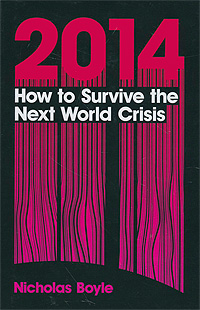Книга: Nicholas Boyle «2014: How to Survive the Next World Crisis»

|
Top Cambridge public intellectual argues for economic, political reform if the dire events at the opening of the 20th century are not to be repeated. A new world crisis is already looming. By the middle of Obama's second term, or of the first term of his, presumably Republican, successor, America's legacy to the 21st century will be decided. Will it be a century of climatic disaster and war? The roots of the present crisis lie in an unbalanced globalization which has failed to match economic with political integration. False models of nationhood, markets, and empires have hindered the development of global governance. These illusions in turn are part of the ideology of American exceptionalism. If human civilization is to survive the 21st century, that ideology will have to give way to a more realistic acceptance of supranational authorities, and especially of an enhanced IMF and WTO. The banking collapse of 2007-8 calls for a revived understanding of the interdependence of politics... Издательство: "Continuum" (2010) Формат: 135x205, 192 стр.
ISBN: 978-1-4411-8509-9 Купить за 491.7 руб на Озоне |
Nicholas Boyle
| Nicholas Boyle | |
|---|---|
| Born | 18 June 1946 |
| Occupation | academic and biographer |
| Nationality | British |
Nicholas Boyle FBA (born June 18, 1946) is the Schröder Professor of German at the University of Cambridge and a fellow of Magdalene College, Cambridge. He has written widely on German literature, intellectual history and religion and is known particularly for his award-winning extensive biography of Goethe (of which two of a projected three volumes have been published).[1] Boyle became a fellow of the British Academy in 2000.[2]
Boyle's biography of Goethe currently runs to two volumes and he is writing the third. George Steiner has called him a 'critic of vivacious perspicacity' and compares the scope of his work to "Lord Bullock's double portraits of Hitler and Stalin, Richard Holmes's Coleridge, David Cairns's Berlioz, Michael Holroyd's Shaw, Richardson's Picasso", whilst The New York Times Book Review describes his biography as a 'remarkable achievement', adding that 'there is nothing comparable to this study in any language'.[3] The biography has been translated into German by Holger Fliessbach. The Goethe Institut awarded Boyle their Goethe Medal in 2000. The second volume was shortlisted for the British Academy Book Prize in 2001.[4]
Bibliography
- Nicholas Boyle, 2014 - How to Survive the Next World Crisis (Continuum Books, 2010)
- Nicholas Boyle, German Literature: A Very Short Introduction (Oxford: Oxford University Press, 2008)
- Nicholas Boyle, Sacred and Secular Scriptures: A Catholic Approach to Literature (University of Notre Dame Press, 2004)
- Nicholas Boyle and John Guthrie (eds.) Goethe and the English-speaking World (Boydell and Brewer, 2002)
- Nicholas Boyle, Who Are We Now?: Christian Humanism and the Global Market from Hegel to Heaney (Continuum, 2000)
- Nicholas Boyle, Goethe: The Poet and the Age Volume II: Revolution and Renunciation, 1790-1803 (Oxford, Clarendon Press, 2000)
- Nicholas Boyle, Goethe: The Poet and the Age: Volume I: The Poetry of Desire (1749-1790) (Oxford: Oxford University Press, 1991)
- Nicholas Boyle, Goethe: Faust Part One (Cambridge: Cambridge University Press, 1986)
- Nicholas Boyle, Martin Swales and Joseph Peter Stern (eds.), Realism in European literature: essays in honour of JP Stern (Cambridge: Cambridge University Press, 1986)
External links
- Boyle's Profile at the University of Cambridge Department of German and Dutch
- 'More than just an old Romantic' Review of Goethe: The Poet and the Age Vol II by George Steiner, The Guardian,January 30, 2000.
- Review of Goethe: The Poet and the Age Vol II by R. Stephenson, Modern Language Review 97 pp. 484–487.
References
- ^ Staff profile - Professor Nicholas Boyle
- ^ Accessed 24th June 2008
- ^ http://books.guardian.co.uk/critics/reviews/0,5917,130858,00.html Accessed 24th June 2008 and http://www.oup.com/us/catalog/general/subject/LiteratureEnglish/WorldLiterature/Germany/~~/dmlldz11c2EmY2k9OTc4MDE5OTI1NzUxNQ== Accessed 24th June 2008
- ^ Accessed 24th June 2008
| This biography article of a United Kingdom academic is a stub. You can help Wikipedia by expanding it. |
